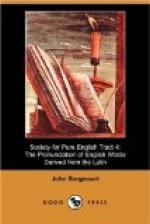STEMS IN -DO AND -TO (-SO). These words lose the final Latin syllable and keep the stress on the vowel which bore it in Latin. The stressed vowel, except in au, eu, is short, even when, as in ‘vivid’, ‘florid’, it was long in classical Latin. This, of course, is in accord with the English pronunciation of Latin. Examples are ‘acid’, ‘tepid’, ‘rigid’, ‘horrid’, ‘humid’, ’lurid ’, ‘absurd’, ‘tacit’, ‘digit’, ‘deposit’, ‘compact’, ‘complex’, ‘revise’, ‘response’, ‘acute’. Those which have the suffix _-es_ prefixed throw the stress back, as ‘honest’, ‘modest’. Those which have the suffix _-men_ prefixed also throw the stress back, as ‘moment’, ‘pigment’, ‘torment’, and to the antepenultima, if there be one, as ‘argument’, ‘armament’, ‘emolument’, the penultimate vowel becoming short or obscure. In ‘temperament’ the tendency of the second syllable to disappear has carried the stress still further back. We may compare ‘S[’e]ptuagint’, where u becomes consonantal. An exception for which I cannot account is ‘cem[’e]nt’, but Shakespeare has ‘c[’e]ment’.
STEMS IN -T[=A]T. These are nouns and have the stress on the antepenultima, which in Latin bore the secondary stress. They of course show the usual shortening of the vowels with the usual exceptions. Examples are ‘charity’, ‘equity’, ‘liberty’, ‘ferocity’, ‘authority’, and with long antepenultima ‘immunity’, ‘security’, ‘university’. With no vowel before the penultima the long quality is, as usual, preserved, as in ‘satiety’.
STEMS IN -OSO. These are adjectives and throw the stress back to the antepenultima, if there be one. In disyllables the penultimate vowel is long, as in ‘famous’, ‘vinous’; in longer words the antepenultimate vowel is short, as ‘criminous’, ‘generous’. Many, however, fall under the ‘alias’ rule, as ‘ingenious’, ‘odious’, while those which have i in the penultimate run the two last syllables into one, as ‘pernicious’, ‘religious’, ‘vicious’. A few late introductions, coming straight from the Latin, retained the Latin stress, as ‘morose’, ‘verbose’.
STEMS IN -T[=O]RIO AND -S[=O]RIO. In these words the stress goes back to the fourth syllable from the end, this in Latin having the secondary stress, or, as in ‘circulatory’, ‘ambulatory’, even further. In fact the o, which of course is shortened, tends to disappear. Examples are ‘declamatory’, ‘desultory’, ‘oratory’, ‘predatory’, ‘territory’. Three consonants running, as in ‘perfunctory’, keep the stress where it has to be in a trisyllable, such as ‘victory’. So does a long vowel before r and another consonant, as in ‘precursory’. Otherwise two consonants have not this effect, as in ‘pr[’o]montory’, ‘c[’o]nsistory’. In spite of Milton’s
A gloomy Consistory, and them amidst
With looks agast and sad he thus bespake,
the word is sometimes mispronounced.




